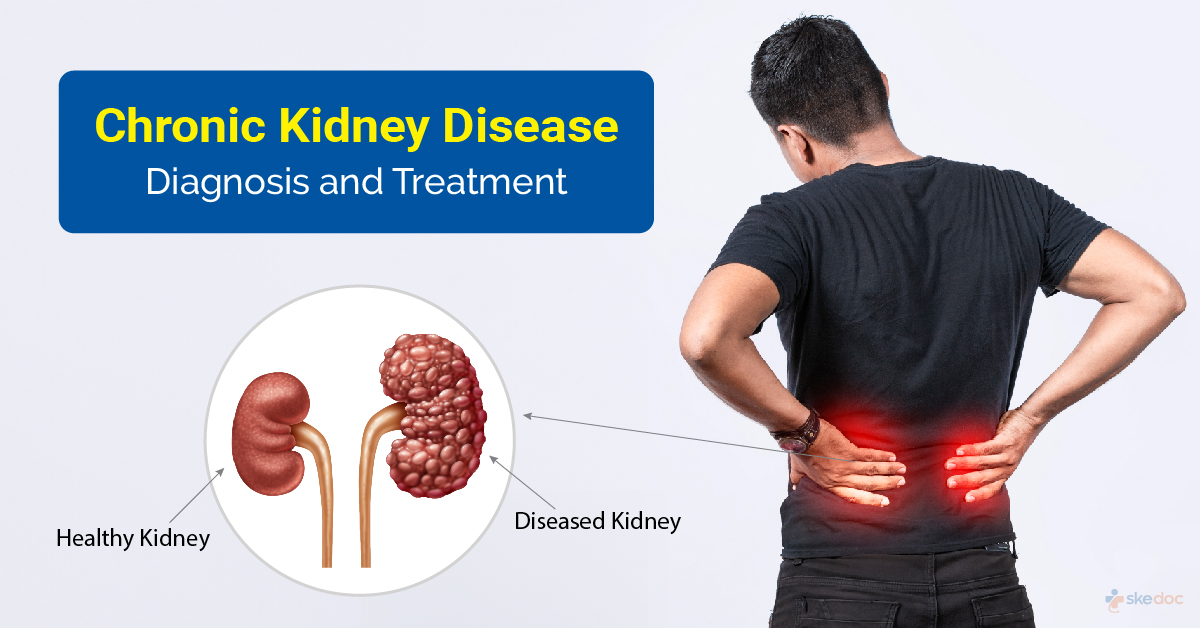Allergy
Blood Diseases
Bone & Joints
Brain
Cancer
Child Care
Cosmetic Surgery
Diabetes
Endocrinology
ENT
Eye
Gen Medicine
General Surgery
Heart
Kidney
Lifestyle
Liver & Digestive
Lung
Men’s Health
Mental health
Physiotherapy
Rheumatology
Skin and hair
Sleep Disorders
Spine
Transplant
Women Health
Thyroid
Vascular Surgery
Chronic Kidney Disease

Overview
Kidneys are the two important organs situated in the loin area of the abdomen. The main function of the kidney is to filter the body fluids and excrete toxic substances and excessive fluids from the body through urine.
Chronic kidney disease, popularly known as chronic kidney failure, is a condition that involves a gradual loss of function of the kidney. Chronic kidney disease will result in causing kidney failure, which is also known as end-stage kidney failure.
Causes
Chronic kidney disease can be caused due to various reasons. A few of them are listed below:
- Hypertension or high blood pressure
- Type 1 and 2 Diabetes mellitus
- Glomerulonephritis- it is defined as the inflammation of the kidney’s filtering units
- Polycystic kidney disease or other inherited kidney disease
- Recurrent kidney infections
- Prolonged obstruction of the urinary tract
- Interstitial nephritis
- Vesicourethral reflux
- Other autoimmune disorders
- Congenital kidney disease
Risk factors
The risk factors that are associated with chronic kidney disease include:
- Smoking
- Obesity
- Family history of kidney disease
- Older age group people
- Abnormal kidney structure
- Regular usage of medicines that can result in kidney failure
- Cardiovascular disease co-morbidities
- Hyperlipidemia
Signs and symptoms of chronic kidney failure
The signs and symptoms of kidney disease vary from person to person; they depend on the severity of the condition, the age of the patient, associated co-morbidities, and many more. A few of the signs and symptoms are listed below:
- Swelling of the legs, feet, and hands
- Fatigue
- Fever
- Change in color of the urine
- Breathing difficulty or shortness of breath
- Abnormal levels of calcium, potassium, or vitamin D
- High blood pressure
- Sleep problem
- Nausea, & vomiting
- Metallic taste in the mouth and ammonia breath
- Muscle cramps, chest pain, etc.
Diagnosis
Whenever the patient notices any of the symptoms as mentioned above, one should consult the doctor immediately. The doctor, to confirm the condition, will conduct a couple of tests, which include:
- Physical examination- During the physical examination, the doctor will examine the patient thoroughly to look for any signs of abnormalities.
- Family history of the patient- The doctor will record the patient's family history and medical history.
- Investigational tests-Include complete blood count, urine test, kidney function test, GFR test, serum creatinine level test, and blood urea levels.
- Investigational scans- Include ultrasonography of the kidneys, CT scan, MRI scan of the abdomen
- Biopsy of the kidney- During this test, a small tissue from the kidney is taken and sent for pathological studies.
Treatment
There is no cure for chronic kidney disease. Depending on the cause and the type of kidney disease, the treatment pattern for kidney disease varies. The treatment options include:
Medications
Medications can help in relieving symptoms that are associated with medications. They include:
- Medications to reduce high blood pressure- They include ACE inhibitors (angiotensin-converting enzymes) or angiotensin II receptor blockers in order to preserve kidney functions
- Medications to relieve swelling- patients diagnosed with chronic kidney disease will often have fluid retention in the body, which can result in swelling of the hands, feet, and legs. They include diuretics, which can help balance body fluids
- Medications to treat anemia
- Medications to lower the lipid (cholesterol) levels in the body. They include statins, which will help in removing bad cholesterols in the body
- Calcium and vitamin D supplements
- Phosphate binders are advised to reduce the phosphate levels in the body
Diet and lifestyle modifications
Dietary changes will help in improving the quality of life of the patient. They include:
- Avoid products with added salt to the diet
- Low protein diet
- Lower potassium food
- Avoid smoking
- Consult the doctor prior to taking supplements or over the counter (OTC) medications
End stage renal disease treatment
People who are diagnosed with end stage kidney disease (ESRD) cannot be managed alone with medications. They have to undergo
- Dialysis- It is a process that removes waste products and extra fluids from the blood. Dialysis can be done in two ways- peritoneal dialysis and hemodialysis.
- Kidney transplant- It is a last resort option, which the doctor would advise the patient.
Complications associated with kidney disease
Treating chronic kidney disease is essential to prevent the worsening of the condition. Kidney disease, if left untreated, will result in severe complications, and in some cases, if left untreated, can result in death to the patient. A few of the complications that are associated with chronic kidney disease are listed below:
- Anemia
- Pulmonary edema is caused due to fluid retention in the lungs
- Heart disease
- Increased risk of bone fracture or weak bone due to calcium and vit D deficiency
- Erectile dysfunction
- Pericarditis (inflammation of the heart muscle)
- Irreversible damage to the kidney
- Damage to the central nervous system, which can result in diminished concentration, seizures, and personality changes
Prevention
Although chronic kidney disease cannot be prevented completely, however, there are a few risk factors that can be prevented by following these instructions. They include:
- Quit smoking
- Avoid alcohol intake
- Salt restriction in the diet
- Low sodium and potassium in the diet
- Maintain a healthy weight
- Consult the doctor regularly
- Follow instructions on over the counter medications.
- Maintain a balanced and healthy diet
- Manage the blood sugar levels and high blood pressure
- Exercise regularly
Was this article helpful?
YesNo




